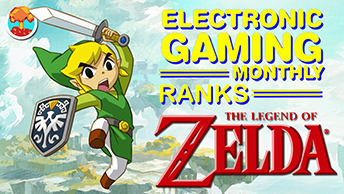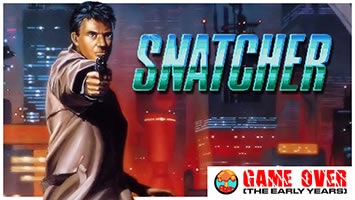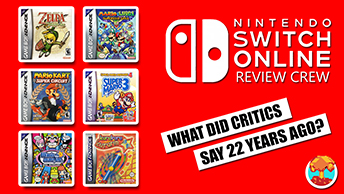- CLASSIC MAGAZINES
- REVIEW CREW
A show recapping what critics thought back
when classic games first came out! - NEXT GENERATION'S BEST & WORST
From the worst 1-star reviews to the best
5-stars can offer, this is Next Generation! - NINTENDO POWER (ARCHIVE)
Experience a variety of shows looking at the
often baffling history of Nintendo Power! - MAGAZINE RETROSPECTIVE
We're looking at the absolutely true history of
some of the most iconic game magazines ever! - SUPER PLAY'S TOP 600
The longest and most ambitious Super NES
countdown on the internet! - THEY SAID WHAT?
Debunking predictions and gossip found
in classic video game magazines! - NEXT GENERATION UNCOVERED
Cyril is back in this spin-off series, featuring the
cover critic review the art of Next Generation! - HARDCORE GAMER MAGAZING (PDF ISSUES)
Download all 36 issues of Hardcore Gamer
Magazine and relive the fun in PDF form!
- REVIEW CREW
- ELECTRONIC GAMING MONTHLY
- ELECTRONIC GAMING MONTHLY RANKS
From Mario to Sonic to Street Fighter, EGM
ranks classic game franchises and consoles! - ELECTRONIC GAMING MONTHLY BEST & WORST
Counting down EGM’s best and worst reviews
going year by year, from 1989 – 2009! - ELECTRONIC GAMING BEST & WORST AWARDS
11-part video series chronicling the ups and
downs of EGM’s Best & Worst Awards!
- ELECTRONIC GAMING MONTHLY RANKS
- GAME HISTORY
- GAME OVER: STORY BREAKDOWNS
Long-running series breaking down game
stories and analyzing their endings! - A BRIEF HISTORY OF GAMING w/ [NAME HERE]
Real history presented in a fun and pithy
format from a variety of game historians! - THE BLACK SHEEP
A series looking back at the black sheep
entries in popular game franchises! - INSTANT EXPERT
Everything you could possibly want to know
about a wide variety of gaming topics! - FREEZE FRAME
When something familiar happens in the games
industry, we're there to take a picture! - I'VE GOT YOUR NUMBER
Learn real video game history through a series
of number-themed episodes, starting at zero! - GREAT MOMENTS IN BAD ACTING
A joyous celebration of some of gaming's
absolute worst voice acting!
- GAME OVER: STORY BREAKDOWNS
- POPULAR SHOWS
- DG NEWS w/ LORNE RISELEY
Newsman Lorne Riseley hosts a regular
series looking at the hottest gaming news! - REVIEW REWIND
Cyril replays a game he reviewed 10+ years
ago to see if he got it right or wrong! - ON-RUNNING FEUDS
Defunct Games' longest-running show, with
editorials, observations and other fun oddities! - DEFUNCT GAMES QUIZ (ARCHIVE)
From online quizzes to game shows, we're
putting your video game knowledge to the test!- QUIZ: ONLINE PASS
Take a weekly quiz to see how well you know
the news and current gaming events! - QUIZ: KNOW THE GAME
One-on-one quiz show where contestants
find out if they actually know classic games! - QUIZ: THE LEADERBOARD
Can you guess the game based on the classic
review? Find out with The Leaderboard!
- QUIZ: ONLINE PASS
- DEFUNCT GAMES VS.
Cyril and the Defunct Games staff isn't afraid
to choose their favorite games and more! - CYRIL READS WORLDS OF POWER
Defunct Games recreates classic game
novelizations through the audio book format!
- DG NEWS w/ LORNE RISELEY
- COMEDY
- GAME EXPECTANCY
How long will your favorite hero live? We crunch
the numbers in this series about dying! - VIDEO GAME ADVICE
Famous game characters answer real personal
advice questions with a humorous slant! - FAKE GAMES: GUERILLA SCRAPBOOK
A long-running series about fake games and
the people who love them (covers included)! - WORST GAME EVER
A contest that attempts to create the worst
video game ever made, complete with covers! - LEVEL 1 STORIES
Literature based on the first stages of some
of your favorite classic video games! - THE COVER CRITIC
One of Defunct Games' earliest shows, Cover
Critic digs up some of the worst box art ever! - COMMERCIAL BREAK
Take a trip through some of the best and
worst video game advertisements of all time! - COMIC BOOK MODS
You've never seen comics like this before.
A curious mix of rewritten video game comics!
- GAME EXPECTANCY
- SERIES ARCHIVE
- NINTENDO SWITCH ONLINE ARCHIVE
A regularly-updated list of every Nintendo
Switch Online release, plus links to review! - PLAYSTATION PLUS CLASSIC ARCHIVE
A comprehensive list of every PlayStation
Plus classic release, including links! - RETRO-BIT PUBLISHING ARCHIVE
A regularly-updated list of every Retro-Bit
game released! - REVIEW MARATHONS w/ ADAM WALLACE
Join critic Adam Wallace as he takes us on a
classic review marathon with different themes!- DEFUNCT GAMES GOLF CLUB
Adam Wallace takes to the links to slice his way
through 72 classic golf game reviews! - 007 IN PIXELS
Adam Wallace takes on the world's greatest spy
as he reviews 15 weeks of James Bond games! - A SALUTE TO VAMPIRES
Adam Wallace is sinking his teeth into a series
covering Castlevania, BloodRayne and more! - CAPCOM'S CURSE
Adam Wallace is celebrating 13 days of Halloween
with a line-up of Capcom's scariest games! - THE FALL OF SUPERMAN
Adam Wallace is a man of steel for playing
some of the absolute worst Superman games! - THE 31 GAMES OF HALLOWEEN
Adam Wallace spends every day of October afraid
as he reviews some of the scariest games ever! - 12 WEEKS OF STAR TREK
Adam Wallace boldly goes where no critic has
gone before in this Star Trek marathon!
- DEFUNCT GAMES GOLF CLUB
- DAYS OF CHRISTMAS (ARCHIVE)
Annual holiday series with themed-episodes
that date all the way back to 2001!- 2015: 30 Ridiculous Retro Rumors
- 2014: 29 Magazines of Christmas
- 2013: 29 Questionable Power-Ups of Christmas
- 2012: 34 Theme Songs of Christmas
- 2011: 32 Game Endings of Christmas
- 2010: 31 Bonus Levels of Christmas
- 2009: 30 Genres of Christmas
- 2008: 29 Controls of Christmas
- 2007: 34 Cliches of Christmas
- 2006: 33 Consoles of Christmas
- 2005: 32 Articles of Christmas
- 2004: 31 Websites of Christmas
- 2003: 29 Issues of Christmas
- 2002: 28 Years of Christmas
- 2001: 33 Days of Christmas
- NINTENDO SWITCH ONLINE ARCHIVE
- REVIEW ARCHIVE
- FULL ARCHIVE
PC Gaming Will Die By 2002 (Retro Rumor #28)
Welcome to 30 Ridiculous Retro Rumors, a brand new series that will run daily between November 26 and December 25, 2015. This is a series where we debunk some of the craziest rumors and predictions of all time.
Today we're looking at the PC market, which some feared would die completely by 2002. Let Next Generation explain it all in today's episode of 30 Ridiculous Retro Rumors.
This is a real rumor taken directly from the March 2000 issue of Next Generation ...

Do you remember Harold Camping? He was the crazy old cook who predicted the world would come to an end in 1994. And when it didn't happen, he moved the date up back to 1995. And then moved it again to 2011. Obviously he was he wrong, but each prediction gave him an opportunity to spread his paranoid delusions with a wider audience. Here was a man so afraid of society changing, that he found himself hoping for literal End Times.
While Robert Dyer may not be as deranged as Harold Camping, his hyperbolic prediction feels just as paranoid. With the Dreamcast already on the market, and the PlayStation 2, GameCube and Xbox waiting in the wings, traditional PC developers were starting to feel the pinch. They worried that games and experiences normally found on computer would jump to home consoles, spelling certain doom for the PC market.
Robert's dire prediction ran counter to Next Generation's otherwise rosy coverage. This was a magazine that championed risk-taking computer games and named the PC the game machine of the year in 1997. But with broadband taking over and new consoles stealing the best games, there was real fear that something had to give.
Ironically, most of Robert's greatest fears ended up working to the benefit of the PC market. While the broadband-connected world helped console makers like Sony and Microsoft, it was a much bigger boon to the market he feared would dry up. This opened the door to digital distribution, which flooded the market with games both big and small. Within a few years of this prediction we saw the rise of Steam and a whole host of innovations you could only find on PC.
The dreaded blurring of the lines also benefited traditional computer gamers. Not only did Half-Life and Quake find their way to home consoles, but Mortal Kombat and Final Fantasy made the jump to PC. These days it's rare to see a major console game released without a PC port, even if some of them are less than ideal. To this day we still see big budget games being made for the PC market, and it doesn't look like that's going to change any time soon.
As for Robert Dyer, he bounced from one company to the next after making this failed prediction. He landed at Crave Entertainment soon after leaving Eidos, which was soon followed by Sony Computer Entertainment. Recently, Robert was the Vice President of Partner Publishing at Zynga. He left in 2013.
Harold Camping also left in 2013, but not for the same reasons.
This is a real rumor taken directly from the March 2000 issue of Next Generation ...

Do you remember Harold Camping? He was the crazy old cook who predicted the world would come to an end in 1994. And when it didn't happen, he moved the date up back to 1995. And then moved it again to 2011. Obviously he was he wrong, but each prediction gave him an opportunity to spread his paranoid delusions with a wider audience. Here was a man so afraid of society changing, that he found himself hoping for literal End Times.
While Robert Dyer may not be as deranged as Harold Camping, his hyperbolic prediction feels just as paranoid. With the Dreamcast already on the market, and the PlayStation 2, GameCube and Xbox waiting in the wings, traditional PC developers were starting to feel the pinch. They worried that games and experiences normally found on computer would jump to home consoles, spelling certain doom for the PC market.
Robert's dire prediction ran counter to Next Generation's otherwise rosy coverage. This was a magazine that championed risk-taking computer games and named the PC the game machine of the year in 1997. But with broadband taking over and new consoles stealing the best games, there was real fear that something had to give.
Ironically, most of Robert's greatest fears ended up working to the benefit of the PC market. While the broadband-connected world helped console makers like Sony and Microsoft, it was a much bigger boon to the market he feared would dry up. This opened the door to digital distribution, which flooded the market with games both big and small. Within a few years of this prediction we saw the rise of Steam and a whole host of innovations you could only find on PC.
The dreaded blurring of the lines also benefited traditional computer gamers. Not only did Half-Life and Quake find their way to home consoles, but Mortal Kombat and Final Fantasy made the jump to PC. These days it's rare to see a major console game released without a PC port, even if some of them are less than ideal. To this day we still see big budget games being made for the PC market, and it doesn't look like that's going to change any time soon.
As for Robert Dyer, he bounced from one company to the next after making this failed prediction. He landed at Crave Entertainment soon after leaving Eidos, which was soon followed by Sony Computer Entertainment. Recently, Robert was the Vice President of Partner Publishing at Zynga. He left in 2013.
Harold Camping also left in 2013, but not for the same reasons.
HOME |
CONTACT |
NOW HIRING |
WHAT IS DEFUNCT GAMES? |
NINTENDO SWITCH ONLINE |
RETRO-BIT PUBLISHING
Retro-Bit |
Switch Planet |
The Halcyon Show |
Same Name, Different Game |
Dragnix |
Press the Buttons
Game Zone Online | Hardcore Gamer | The Dreamcast Junkyard | Video Game Blogger
Dr Strife | Games For Lunch | Mondo Cool Cast | Boxed Pixels | Sega CD Universe | Gaming Trend
Game Zone Online | Hardcore Gamer | The Dreamcast Junkyard | Video Game Blogger
Dr Strife | Games For Lunch | Mondo Cool Cast | Boxed Pixels | Sega CD Universe | Gaming Trend
Copyright © 2001-2025 Defunct Games
All rights reserved. All trademarks are properties of their respective owners.
All rights reserved. All trademarks are properties of their respective owners.
























